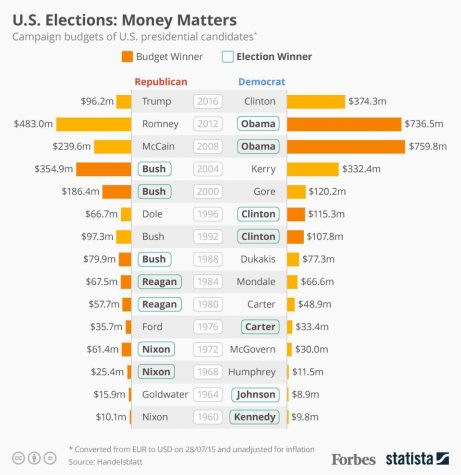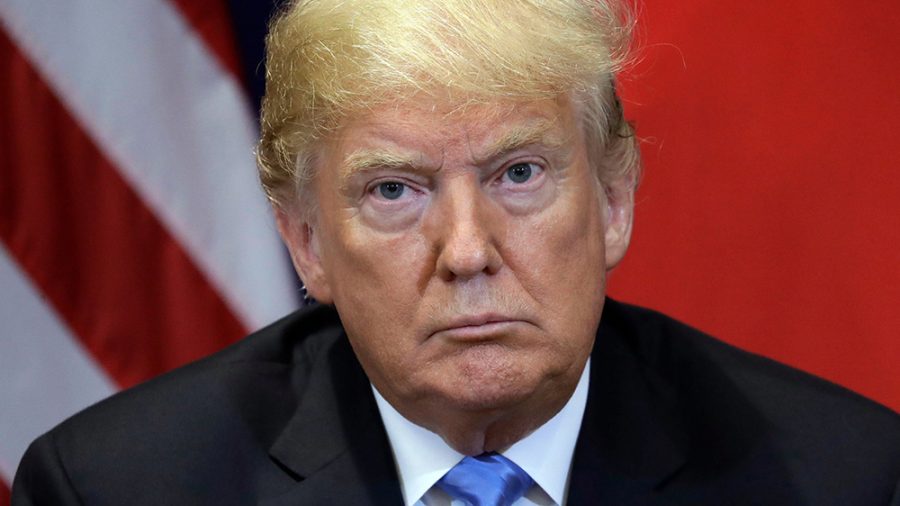America: Capital Over Citizens
The country has had an extensive history of business influence in its government
Evan Vucci/AP/REX/Shutterstock
Mandatory Credit: Photo by Evan Vucci/AP/REX/Shutterstock (9896574k) President Donald Trump listens as he meets with Japanese Prime Minister Shinzo Abe at the Lotte New York Palace hotel during the United Nations General Assembly, in New York Trump, New York, USA – 26 Sep 2018
October 24, 2018
America is the prime symbol for the free world. Valor, vigilance and purity are sewed into the country’s flag. Citizens celebrate freedom through the national anthem and daily pledge. The ideals of citizen voice and freedom are pounded into the skulls of Americans, yet the country may stand for capital rather than its citizens.
The United States’ governmental system is difficult to figure out. It is not a monarchy or dictatorship. Despite a single person in the highest office, the extensive branches of government, in addition to the president lacking ultimate power, separate the US from Adolf Hitler’s Germany or King George III’s Great Britain. It is the inverse of a confederation, due to most governmental power residing in Washington D.C. rather than individual states.
Most label the US as a democracy, however this is a distorted classification. There are two types: parliamentary and presidential. In a parliamentary democracy, all political power is centered in a legislature or parliament, with the prime minister serving as a member of office. Voters choose a chief executive separate from legislation but restricted by other branches of government in a presidential democracy. Fundamentally, the United States is a presidential democracy. However, this is a broad spectrum. It closely relates to a federal constitutional republic, a constitutional republic with federal systems.
According to Scholastic, in a constitutional republic, “The constitution may thus be only a paper facade, and in order to understand how the country is governed one must examine the actual political process.” The United States has a constitution that serves as legal framework, and examining the document serves as a lesson for how the government works. In federal systems, “The national governments of these countries are clearly more powerful than those of their subdivisions, even though the constitutions delegate many powers and responsibilities to the subnational units.” Both describe the US perfectly, thus the United States is a federal constitutional republic.
The country’s government is clearer when similar systems are looked at. All of Argentina, Austria, Bosnia and Herzegovina, Brazil, Ethiopia, Germany, India, Mexico, Nepal, Nigeria, Pakistan, Russia and Venezuela are classified as federal republics. Each are divided into states or provinces with a single president like the United States.
However, the US is primarily similar to only one of these: Russia.
In January of this year, The US Treasury released a list of 210 prominent Russians with close ties to Vladimir Putin.
“The list, which the US administration had been required by law to release, includes 114 senior political figures and 96 oligarchs [prominent businessmen with powerful influences in politics], all of whom rose to prominence under Russian President Vladimir Putin,” the report stated.
Furthermore, a 2013 report by Credit Suisse found the country’s 110 wealthiest individuals possessed 35% of the wealth of Russia.
Both of these facts point to Russia being an oligarchy, a country where a select wealthy few control the government with businesses having a substantial say in government.
Four of the top five private beneficiaries from Russian government contracts in 2015 are part of Putin’s inner circle. Arkady Rotenberg, Putin’s former judo sparring partner, benefitted from 7.8 billion dollars in government benefits. Gennady Timchenko is a longtime associate of Putin and Kirill Shamalov is married to the president’s younger daughter. Rotenberg’s son, Igor, gained 1.4 billion dollars in state contracts. All of these men were on the “Putin List”. Rather than climbing their way up Russia’s political and business system, these people gained large contracts due to their close ties to Putin.
The United States is similar with Russia due to both possessing oligarchical structures.
Economist Edward N. Wolff found the top 1% owned 40% of the United States’ wealth in 2017, even more than Russian oligarchs control in their country. In 2013, they owned 37%, meaning the rich have become wealthier over time. This growth equates to .75% a year, meaning this continued trend would result in the top 1% owning 64.75% of the United States’ wealth in 2050. The percentage may increase under Trump’s America due to many wealthy businessmen supporting him.
Charles Koch is an epitome of a United States oligarch. He owns Invista, Georgia-Pacific, Molex, Flint Hills Resources, Koch Pipeline, Koch Fertilizer, Koch Minerals, Matador Cattle Company and Guardian Industries. His net worth equates to 53.9 billion dollars as of 2018, making him the 12th richest person in the world.
He has been in favor of Trump’s America, primarily with the tax cuts that came in late 2017 because it would help his colossal empire expand. The Koch network poured millions of dollars to convince Americans to support the tax cuts at the time, meaning a businessman had a substantial role in helping the cuts come to fruition. Koch is a blatant oligarch who will gain even more power due to Trump’s CEO-friendly ideals.
Looking Trump’s campaign for the 2016 election shows oligarchs involvement in his success.
“The biggest winners by far will be American oligarchs such as the Koch brothers; Peter Thiel, the Silicon Valley investor; Sheldon Adelson, the Las Vegas casino magnate; Woody Johnson, owner of the New York Jets football team and heir to the Johnson & Johnson fortune; and Carl Icahn, the activist investor,” an article from the Chicago Tribune said. “They’ve poured hundreds of millions into the GOP and Trump. About 40 percent of all contributions for the entire federal election came from the richest 0.01 percent of the American population.”
It is clear elites supported Trump’s government and helped further his political career through campaign donations. Critics argue campaign funds do not help a candidate if they are running on an odious platform, thus expounding how oligarchies do not curve the outcome of elections. However, research done by Thomas Ferguson found only one president won the election with the cheapest of the two campaigns (Jimmy Carter, John F. Kennedy and Lyndon B. Johnson all had lower campaign funds, yet Kennedy and Johnson are cited as two of the richest presidents in history). Trump had lower campaign funds than Hillary Clinton, yet his extensive personal wealth (3.1 billion dollars) is not included in campaign funds. This was instrumental in his victory.
A graphic from Forbes supports Ferguson’s data.

This information makes it clear that an enormous campaign is a brazen indicator of the outcome of US elections. However, this data only goes back so far. Thus, it arises the thought of how long America has been an oligarchy.
The Motely Fool published an article describing the 10 richest presidents in United States history. Among them were George Washington, Thomas Jefferson, James Madison and Andrew Jackson. The first three are Founding Fathers, with Jackson taking office only 20 years after Madison became president. All of these men were extremely rich leaders who were surrounded by wealthy politicians. However, the source of their wealth is more crucial than their net worth. Washington claimed his fortune by virtue of his land and slave ownership, likewise with Jefferson and Madison. Jackson became wealthy due to his service as a Tennessee judge and his position as general in the military during the War of 1812. Land owners and government officials were incredibly wealthy during America’s infancy.
It is clear oligarchs did not control early presidents, yet the rich were directly in power. Specific campaign numbers cannot be found on earlier presidents, however this trend most likely continued. Abraham Lincoln, Ulysses Grant, William McKinley and Harry Truman did not have one million dollars in personal funds during their lifetime, meaning wealthy supporters contributed to their success. Once 1960 rolls around, the trend is blatant in present day.
The United States has not recently become an oligarchy, yet it has historically been such. Exceptions are present, such as wealthy Southern slave owners not influencing the actions of Lincoln. However, the majority of the United States’ history can be identified as an oligarchy.
This system is dangerous for many citizens in the United States. The influence of businesses binds presidents in certain issues.
“During the 2016 presidential campaign, oil companies gave a lot of money to Donald Trump,” said assistant professor of managerial economics at Northwestern University Jörg Spenkuch.
He speculates that Trump feels the obligation to repay these companies back. While the president may not directly provide capital, the repayment causes political decisions. Trump decided to reverse Barack Obama’s halting of the Keystone XL pipeline construction. The president’s promises of helping the energy sector during his campaign are perplexing because of this. TransCanada, the company that owns the Keystone XL, supported Trump during his run. It makes sense why Trump reversed Obama’s halt of construction.
On a broader scope, repayments like this can be disastrous. The pipeline can severely harm natural habitats for animals and humans alike. Trump received funds from many environmentally damaging companies, and, according to BBC, 69% of Trump’s campaign funds are debts to be paid back to gigantic businesses. These companies may pressure the president into making terrifying decisions due to him wanting their continual support in the upcoming election. Critics who think these companies will not pressure Trump into bogus verdicts may be correct, however the opposite is just as senseless.
Slavery was an issue plaguing the US for 84 years (and more if British America is taken into consideration) until Lincoln became president. The majority of the Founding Fathers purposely kept the institution of slavery due to their wealth coming from being slave and land owners. The abolishment of slavery would be detrimental to their wealth and thus their power. It wasn’t until Lincoln, who lacked support from the wealthiest slave owners, abolished slavery and socially progressed America.
An oligarchy may not result in a president creating laws that directly harm the environment or citizens, yet it can keep the United States the way it is in order to stay wealthy for an extended period. If a company, who supports the president, needs to keep citizens in the poor and middle classes in order to stay wealthy, it will battle for the president’s lack of action or their approval of heinous laws.
Oligarchs have historically had a tight grip on America’s government. It is clear businesses have influenced government through election funds and trapping officials into repaying debts through capital and laws. The pernicious effects this influence has is detrimental for the progression of the United States. Trump is the catalyst businesses needed in order to gain complete control of the country. Even more terrifying, most Americans are uninformed about this issue. An oligarchical structure is absent in politics or the news.
America’s reputation to its citizens has always been a free democracy where every voice matters. The suggestion of the country historically being an oligarchy terrifies Americans, not only because of its disastrous effects, but also because it questions their role in government. It threatens the principles America is supposedly founded upon. Citizens do not want to come to the realization that businesses have a legitimately greater say in the operation of America, because it opposes the values of the most basic unalienable rights.
However, Americans need to expose the influence of businesses in our government. The further an oligarchy develops, the more citizens lose their voice. Russia has tampered with many votes in order to keep Putin in power, thus keeping businesses in power. Its citizens have almost lost their say in the direction of their country. If Russia responsible for tampering with the 2016 election to ensure Trump would control the Oval Office, an oligarchy may run even deeper than current evidence suggests. Rather than fearfully repenting the possibility of meddling, Americans need to investigate the prominence of businesses in government and elect a president exempt of connections with oligarchs.
The obscurity of an oligarchy in future America is essential for the conservation of citizen importance. Changing the country’s direction is the only way to break America’s bonds with business advantage. Americans need to repent businesses taking over their country by any means necessary.
If the Oval Office is enslaved, then the people are not free.







